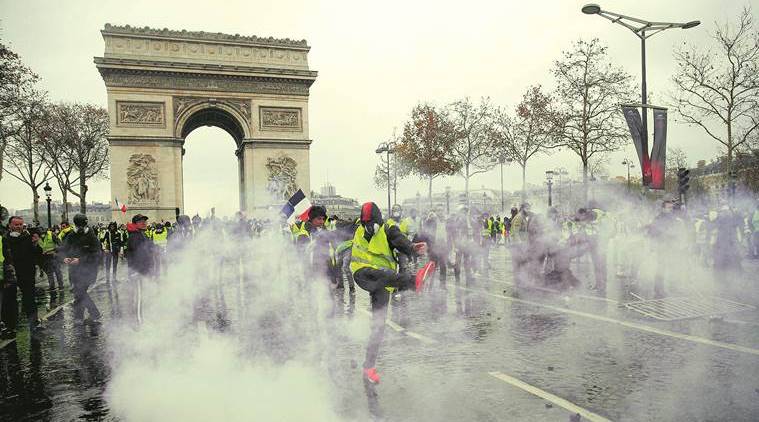Stay updated with the latest - Click here to follow us on Instagram
What travellers need to know about the Paris riots
For now, the museums, shops and metros that were affected have all reopened, but protests, possibly violent ones, could continue on future Saturdays and force the shutdown of transportation, institutions and services.
 Yellow vest protesters fought tear gas and more in Paris. (Reuters Photo)
Yellow vest protesters fought tear gas and more in Paris. (Reuters Photo)
Incited by an impending rise in the gas tax and other economic issues, protesters in Paris, known as Yellow Vests for the neon yellow road workers’ safety vests they wear, have been rioting, looting and setting cars on fire for the past three Saturdays. Here’s what travellers to Paris can expect as a result of the turmoil, and some resources for travel advice and protection.
What areas have been affected?
Yellow Vest protests have occurred around the country, but have been concentrated in Paris, mostly on Saturdays.
Though protest areas may shift, they have focused on the Champs-Élysées, the Élysée Palace and other areas in the First, Eighth, 16th and 17th arrondissements. At least 13 metro stations were closed before the protests last Saturday. Some cultural institutions near the demonstrations were closed pre-emptively on Saturday, including the Arc de Triomphe and the Grand Palais, while others, like the Musée de l’Orangerie, closed some entrances.
For now, the museums, shops and metros that were affected have all reopened, but protests, possibly violent ones, could continue on future Saturdays and force the shutdown of transportation, institutions and services.
Travellers can follow the Prefecture de Police on Twitter and the website of the public transportation system known as the RATP for real-time warnings and travel restrictions (in French only).
Are there other sources for emergency notifications?
Many security experts also advise checking the travel advice published by the Foreign and Commonwealth Office of Britain. Its December 3 update on France notes: “Protests against fuel prices continue across France, leading to blocked roads and motorways in some areas.”
For travellers seeking direct advisory service, the security firm Incident Management Group offers updates to subscribers of its app FoneTrac ($15 for individuals for a month, no minimum term). Its updates on the Yellow Vest protests on Dec. 3 report roadblocks in the South of France and that demonstrations at Total fuel depots caused 75 stations to run out of gas, which was also reported by Reuters.
IMG advises avoiding large gatherings and overt signs of wealth, in stores, vehicles and upscale neighbourhoods, as these have been targets of some protesters.
Will travel insurance help in the case of riots?
“The quick answer for trip cancellation is typically, no,” said Stan Sandberg, the co-founder of TravelInsurance.com, which compares and sells policies. “Civil unrest is typically spelled out as an exclusion in most plans.”
However, travellers in France who have already purchased travel insurance or those considering it for a future trip may find that their policy includes covering missed connections or travel delays. So, if a traveller is unable to get to an airport as planned because of subway or road closures related to the protests, then the policyholder may be able to file a claim for reimbursement.
Another option for nervous travellers is a travel insurance upgrade known as “cancel for any reason.” This allows travellers to cancel their trip up until about two or three days before departure without explaining why. Most policies have to be purchased within a few days or a few weeks of initially buying the trip.
“Cancel for any reason can only be used prior to departure,” said Jenna Hummer, a spokeswoman for Squaremouth, a travel insurance comparison website. It’s also expensive. “It adds about 40 per cent to a policy, which is based on trip cost,” and reimburses 75 per cent, generally, she added.
But since insurance is regulated by states, some do not allow the provision, including New York, though it is available to residents in Connecticut and New Jersey.
How have travel providers reacted?
The tour company Eurobound said its business has been robust despite the unrest and hoteliers have said it’s business as usual in France.
In a statement, Marriott International wrote, “Due to demonstrations in the local area our hotels are open but operating with enhanced security.”
A spokeswoman for Hilton Hotels & Resorts said it, too, is “closely monitoring events in Paris, and none of our hotels have experienced major disruptions to date. The safety and security of our guests and team members is our priority, and we urge guests to check local travel advice before they travel. Any individual booking enquiries should be directed to the hotel in question.”
What does the Indian government say?
The French external affairs ministry has informed the Indian Embassy in France that the conditions to enter the French territory as well as the Schengen zone for a stay of less than 90 days remain unchanged. However, border controls and stricter security measures have been installed. Indian nationals must carry the valid short stay visa along with necessary documents (proof of accommodation, return ticket, insurance and funds etc.) which can be asked to shown upon their arrival in France, even if they entered the Schengen area through some country other than France.
(With additional inputs from indianexpress.com)



- 01
- 02
- 03
- 04
- 05




























